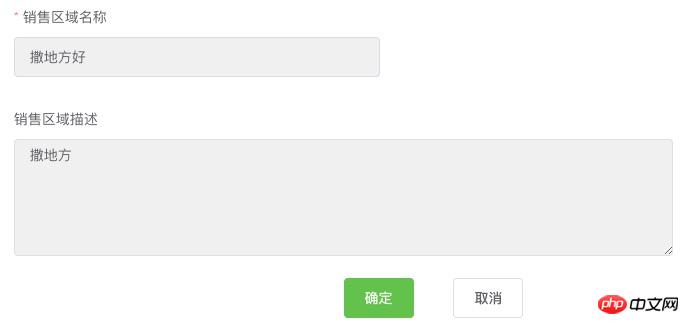Make page jump without using router-link
This time I will introduce to you not to use router-link to make page jumps, and what are the precautions to make without using router-link to make page jumps. The following is a practical case, let's take a look.
1. Set an event for the parent page to jump to
//原来的页面上展示的信息 <p v-if="!addShow" class="function"> <el-row> <template slot-scope="scope"> <el-button type="success" size="mini" @click="handleEdit(scope.$index, scope.row)">编辑</el-button> //带参数进行编辑 <el-button type="danger" size="mini" @click="handleDelete(scope.row)">删除</el-button> </template> </el-row> </p> //要跳转过去的页面用隐藏来代替 <p v-if="addShow" class="add-category "> <el-col :span="20" :offset="2"> <el-form :model="formData" :rules="rules" ref="formData" label-position="left"> <el-row> <el-col :span="10"> <el-form-item label="销售区域名称" prop="name"> <el-input v-model="formData.name"></el-input> //v-model绑定formData.name(name为需要的字段,formDataw为表格ref绑定的数据) </el-form-item> </el-col> </el-row> <el-col :span="18"> <el-form-item label="销售区域描述"> <el-input type="textarea" :rows="5" v-model="formData.description"></el-input> </el-form-item> </el-col> <el-col :span="2" :offset="9"> <el-button type="success" @click="handleSubmit('formData')" >确定</el-button> </el-col> <el-col :span="2" :offset="1"> <el-button @click="onCancel">取消</el-button> </el-col> </el-form> </el-col> </p>
2. JS part
data() {
addShow: false //设置要显示的页面部分默认为false,隐藏
checkdDistributor: null,
},
methods: {
// 编辑按钮
handleEdit(index,row){
this.checkdDistributor = row; //接受传参
this.addShow = true; // addshow为要显示的页面
}
}
watch: {
// 带参数编辑
checkdDistributor(){
for(let attr in this.formData){
this.formData[attr] = ('' + this.checkdDistributor[attr]); //写入参数
}
}
},3. Finally, add the rendering


Supplement:
vue router- Link jump value transfer example
1, router-link
<router-link :to="{name:'deitail',params:{freezeMon:'2017-10',owerName:'西安'}}" tag="p" >
</router-link>2, routes routing
export default new Router({
routes: [
{
path: '/',
name: 'Index',
component: Index
},
{
path: '/deitail',
name: 'deitail',
component: deitail
}
]
})3, value
<h1>{{$route.params.freezeMon}}</h1>4. Summary: What should be paid attention to when transferring values in router-link jumps
* Add before to:
* The name value in { after to must be consistent with the name value in the route
* The following method is wrong
<router-link to="{path:'/deitail',params:{freezeMon:'2017-10',owerName:'西安'}}" tag="p" >
</router-link>I believe you have mastered the method after reading the case in this article. For more exciting information, please pay attention to other related articles on the php Chinese website!
Recommended reading:
vue-simplemde to drag and paste images
File encoding base64 upload through AJAX
The above is the detailed content of Make page jump without using router-link. For more information, please follow other related articles on the PHP Chinese website!

Hot AI Tools

Undresser.AI Undress
AI-powered app for creating realistic nude photos

AI Clothes Remover
Online AI tool for removing clothes from photos.

Undress AI Tool
Undress images for free

Clothoff.io
AI clothes remover

Video Face Swap
Swap faces in any video effortlessly with our completely free AI face swap tool!

Hot Article

Hot Tools

Notepad++7.3.1
Easy-to-use and free code editor

SublimeText3 Chinese version
Chinese version, very easy to use

Zend Studio 13.0.1
Powerful PHP integrated development environment

Dreamweaver CS6
Visual web development tools

SublimeText3 Mac version
God-level code editing software (SublimeText3)

Hot Topics
 How to use bootstrap in vue
Apr 07, 2025 pm 11:33 PM
How to use bootstrap in vue
Apr 07, 2025 pm 11:33 PM
Using Bootstrap in Vue.js is divided into five steps: Install Bootstrap. Import Bootstrap in main.js. Use the Bootstrap component directly in the template. Optional: Custom style. Optional: Use plug-ins.
 How to add functions to buttons for vue
Apr 08, 2025 am 08:51 AM
How to add functions to buttons for vue
Apr 08, 2025 am 08:51 AM
You can add a function to the Vue button by binding the button in the HTML template to a method. Define the method and write function logic in the Vue instance.
 How to use watch in vue
Apr 07, 2025 pm 11:36 PM
How to use watch in vue
Apr 07, 2025 pm 11:36 PM
The watch option in Vue.js allows developers to listen for changes in specific data. When the data changes, watch triggers a callback function to perform update views or other tasks. Its configuration options include immediate, which specifies whether to execute a callback immediately, and deep, which specifies whether to recursively listen to changes to objects or arrays.
 What does vue multi-page development mean?
Apr 07, 2025 pm 11:57 PM
What does vue multi-page development mean?
Apr 07, 2025 pm 11:57 PM
Vue multi-page development is a way to build applications using the Vue.js framework, where the application is divided into separate pages: Code Maintenance: Splitting the application into multiple pages can make the code easier to manage and maintain. Modularity: Each page can be used as a separate module for easy reuse and replacement. Simple routing: Navigation between pages can be managed through simple routing configuration. SEO Optimization: Each page has its own URL, which helps SEO.
 How to return to previous page by vue
Apr 07, 2025 pm 11:30 PM
How to return to previous page by vue
Apr 07, 2025 pm 11:30 PM
Vue.js has four methods to return to the previous page: $router.go(-1)$router.back() uses <router-link to="/" component window.history.back(), and the method selection depends on the scene.
 How to reference js file with vue.js
Apr 07, 2025 pm 11:27 PM
How to reference js file with vue.js
Apr 07, 2025 pm 11:27 PM
There are three ways to refer to JS files in Vue.js: directly specify the path using the <script> tag;; dynamic import using the mounted() lifecycle hook; and importing through the Vuex state management library.
 How to use vue traversal
Apr 07, 2025 pm 11:48 PM
How to use vue traversal
Apr 07, 2025 pm 11:48 PM
There are three common methods for Vue.js to traverse arrays and objects: the v-for directive is used to traverse each element and render templates; the v-bind directive can be used with v-for to dynamically set attribute values for each element; and the .map method can convert array elements into new arrays.
 How to jump to the div of vue
Apr 08, 2025 am 09:18 AM
How to jump to the div of vue
Apr 08, 2025 am 09:18 AM
There are two ways to jump div elements in Vue: use Vue Router and add router-link component. Add the @click event listener and call this.$router.push() method to jump.






